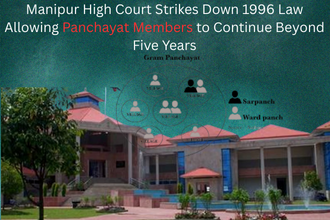The Delhi High Court has recently delivered an important ruling on intellectual property rights in trade dress, restraining Rupa Publications India Pvt. Ltd. from publishing or selling its coat-pocket edition of the Constitution of India. The Court found that Rupa’s edition bore a deceptively similar resemblance to the iconic red-and-black coat-pocket edition published by Eastern Book Company (EBC).
Justice Manmeet Pritam Singh Arora, while passing an interim injunction in EBC Publishing Pvt. Ltd. v. Rupa Publications, observed that the similarity between the two editions was likely to cause confusion among consumers, leading to misrepresentation of source and loss of goodwill to EBC.
Background of the Dispute
Eastern Book Company (EBC), along with its publishing arm Eastern Publishing Pvt. Ltd., has been producing portable “coat-pocket” editions of bare acts since 2009. These editions are easily identifiable due to their distinctive red-and-black colour combination, specific font styles, gold leafing, and thin bible paper. Over the years, these editions have gained immense goodwill and have become a flagship product widely used by:
- Lawyers
- Judges
- Politicians
- Law students
- Members of the general public
EBC argued that Rupa Publications had imitated essential features of its trade dress while marketing a competing coat-pocket edition of the Constitution of India.
According to EBC, in September 2025, they even lost a confirmed order of 18,000 copies, as the buyer was misled by Rupa’s claims that its edition was identical but cheaper.
EBC’s Arguments Before the Court
Senior Advocates Jayant Mehta and Swati Sukumar, appearing for EBC, submitted that:
- Trade Dress Infringement – Rupa had copied the distinctive trade dress of EBC’s edition, including the colour scheme, font, gold detailing, and layout.
- Likelihood of Confusion – The similarities were so striking that an unwary consumer of average intelligence and imperfect recollection would assume the books originated from EBC.
- Loss of Business and Goodwill – EBC’s longstanding reputation and brand recognition were being misappropriated, as Rupa was benefiting commercially from the confusion.
- Bad Faith Conduct – Rupa’s deliberate imitation was designed to mislead buyers and capture EBC’s market share.
Ruling of the Delhi High Court
The Delhi High Court found merit in EBC’s submissions and passed an interim injunction restraining Rupa Publications from publishing, selling, marketing, or distributing the impugned edition.
Key Observations by Justice Manmeet Pritam Singh Arora:
- Trade Dress Protection: The Court reiterated that while no party can monopolize a single colour, a distinctive colour combination and overall trade dress consistently used over time enjoys strong protection under intellectual property law.
- Consumer Confusion: The Court held that to an average consumer, Rupa’s edition was likely to appear identical to EBC’s, creating confusion regarding the source or origin of the book.
- Irreparable Harm: The similarity could result in irreparable damage to EBC’s reputation, goodwill, and business interests.
- Balance of Convenience: The Court noted that the balance of convenience lay in EBC’s favour, as it had established its product design since 2009.
Precedent Relied Upon
Justice Arora relied on the Delhi High Court’s earlier ruling in Colgate Palmolive Co. v. Anchor Health and Beauty Care Pvt. Ltd. The Court in that case had ruled that while no company can claim exclusivity over a single colour, a distinctive colour scheme, packaging, and layout, if consistently used and associated with a product, qualifies for trade dress protection.
This precedent was applied to hold that EBC’s red-and-black trade dress had acquired distinctiveness and was therefore entitled to protection against imitation.
Directions Issued by the Court
The Court issued strong directions against Rupa Publications:
- Restraint on Publication & Sale – Rupa was prohibited from manufacturing, publishing, marketing, or selling the impugned edition in a trade dress deceptively similar to EBC’s iconic design.
- Recall of Unsold Stock – Rupa was directed to recall all unsold inventory from distributors and remove listings from e-commerce platforms.
- Extended Relief – Similar directions were also passed against Young Global Publications and Professional Book Publishers, who were found to be engaging in similar practices.
Representation of Parties
- EBC’s Counsel: Senior Advocates Jayant Mehta and Swati Sukumar argued the matter, along with Senior Advocates Rajshekhar Rao, Abhishek Malhotra, and J Sai Deepak in connected cases.
- Briefing Advocates: Raghavendra Mohan Bajaj, Garima Bajaj, Kumar Karan, Kanav Agarwal, Shagun Agarwal, Zeeshan Ahmed, Sajal Awasthi, Kartikay Dutta, Anukriti Trivedi, and Ritik Raghuvanshi assisted the senior counsels.
Significance of the Ruling
This case has significant implications for intellectual property law in India, particularly concerning trade dress protection:
- Recognition of Trade Dress Rights – The ruling affirms that trade dress, which includes not just colours but also layout, fonts, and overall product design, enjoys protection under IP law.
- Deterrence Against Copycat Products – The injunction sets a precedent discouraging publishers and businesses from imitating distinctive product designs of established brands.
- Consumer Protection – By preventing deceptive similarities, the Court safeguards consumers from being misled regarding the origin and authenticity of products.
- Publishing Industry Impact – The case reinforces the need for ethical publishing practices and may push publishers to innovate rather than imitate.
Conclusion
The Delhi High Court’s order in EBC Publishing Pvt. Ltd. v. Rupa Publications is a landmark decision reinforcing intellectual property rights over trade dress in India. By restraining Rupa from selling its deceptively similar coat-pocket edition of the Constitution, the Court has protected both the goodwill of EBC and the interests of consumers.
As India’s publishing industry continues to expand, this ruling highlights the judiciary’s proactive role in ensuring that distinctive product designs are not misappropriated. It sends a clear message: while competition is encouraged, copying and deception will not be tolerated.
For lawyers, students, and businesses, this case serves as a strong reminder of the importance of safeguarding trade dress and brand identity in today’s competitive market.
Also Read
Delhi High Court Initiates Criminal Contempt Against Lawyer for Calling Judiciary “Corrupt”


